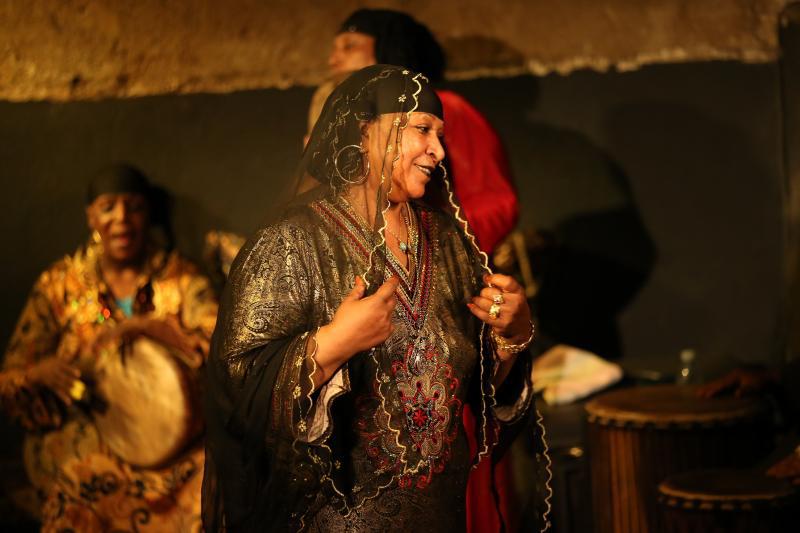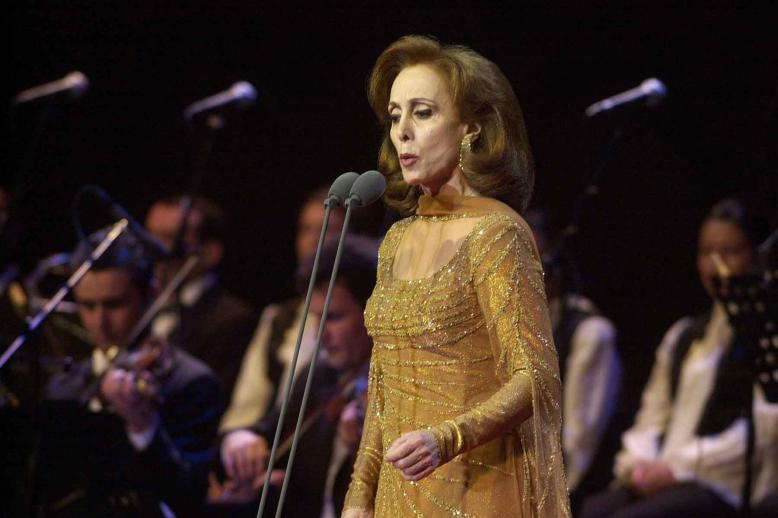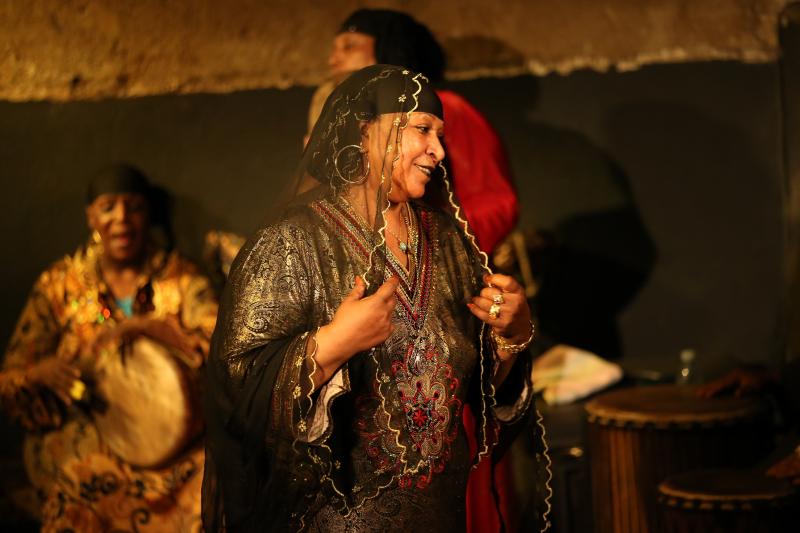Mazaher ensemble maintains Zar music heritage in Egypt
CAIRO - Om Sameh powerfully taps on the drum while singing, with her deep, strong voice, Sufi chants praising Prophet Mohammad and other holy figures. She sways right and left, accompanied by a female chorus that follows her moves and beats their own drums.
Enthusiastic applause greeted the performance that bestowed an exotic and spiritual atmosphere helping release negative energy from the performers and the audience.
Om Sameh, 68, stood firmly on the stage of the Egyptian Centre for Culture and Arts-Makan in Cairo like a maestro controlling the entire scene. She is the lead singer of Mazaher ensemble performing Zar music, a fading Egyptian legacy.
Zar is a community healing ritual of drumming and dancing in which women play a leading role and men have secondary parts. Many of the poly-rhythmic songs and chants are very distinct from other Egyptian music traditions.
The music of Mazaher, one of the last remaining Zar groups, is inspired by three styles of Zar music: the Upper Egyptian Zar, Abul Gheit Zar and the Sudanese or African Zar.
Throughout each performance, communication with unseen spirits is driven by the persistent and varied drum rhythms and energetic movements of the performers in an intense rhythmic interaction that can lead to an altered state of consciousness and, even, trance.
Zar practitioners have been stigmatised and are commonly portrayed in Egyptian cinema as people who release demons from a person. In addition to perpetuating the legacy, the aim of Mazaher is to correct the notion of Zar music being a form of exorcism and tell people that Zar Art is different from the Ancient Zar shown on media outlets, Om Sameh said.
“We have nothing to do with exorcism. The aim of Zar is to harmonise the inner selves of the participants. Our music and songs are spiritual and help relieve listeners from stress and bad vibes,” she said.
The experience of Zar could be cathartic, a physical and spiritual purification that leaves one calm and ready to face the world again.
“The audiences who belong to different nationalities always say that they felt relieved and calm after attending our performances. That’s a gift from God that we can’t really explain,” Om Sameh said.
Mazaher has been playing traditional music, inspired by the captivating musical culture of Upper Egypt. Their unique sound has helped them win the admiration of many music lovers in Cairo.
“I got out of the performance feeling relieved even though I didn’t understand any word. I’m not sure how and why,” said Benno Khulmann, a 30-year old German national.
Heba Ahmed, an Egyptian university student, said she felt as relieved. “I know Zar music has nothing to do with releasing demons but I really feel that my demons have got out of me today,” she said, laughing.
Om Sameh has been singing since she was 11 years old. Her mother was also a Zar singer and she started singing with her mother when she was a little girl in Upper Egypt. Despite her carrying the Zar flag from her mother, none of her children have followed in her footsteps.
The band includes members from different governorates in Upper Egypt.
Like Om Sameh, Mazaher lead male singer Ahmed al-Shankahawy started practising Zar with his family when he was young.
“My mother and grandmother were Zar singers themselves. I used to observe them closely till I grasped the skills of the job,” he said.
Shankahawy recalled the feelings of awe and deep spirituality when he sings. “It’s as if I’m out of time and place when I sing. It’s something I can’t describe with words,” he said.
Mazaher was founded by Makan owner Ahmed el-Maghraby in 1999. “At the time there was no fixed venue for the group to give performances so we did perform abroad till Makan was established and became a permanent venue for Mazaher and other groups,” he said.
Mazaher has performed in France, Poland, Denmark, Belgium, Italy, Spain, Sweden and Germany. It has also given concerts in Morocco, Tunisia, Lebanon, India and Pakistan.
Mazaher musicians and singers are among the few Zar practitioners in Egypt who attempt to preserve the unique musical heritage. Despite their success, the practice of Zar music has nearly vanished.
“There are no notes for Zar music. Neither are the songs we sing written. They are transmitted orally from one generation to another. The one who dies takes the knowledge with him or her,” Om Sameh said sadly.
This article was originally published in The Arab Weekly.







